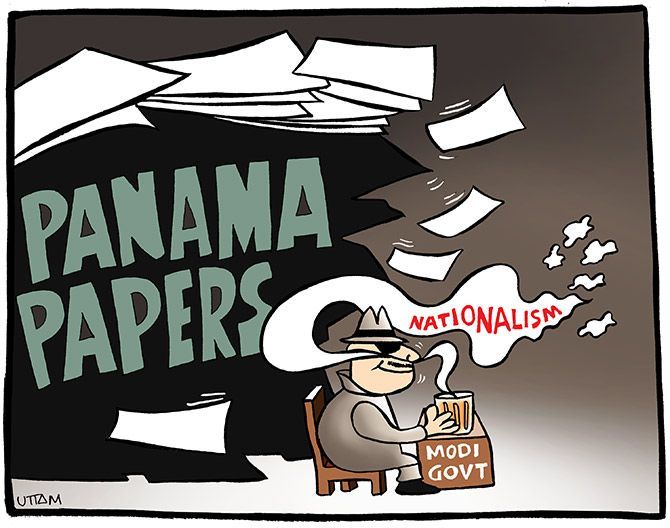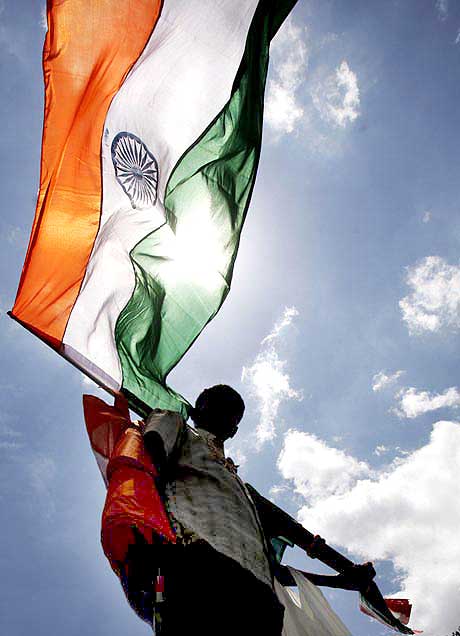'The tax avoidance in India is done as much by the wealthy as the lower class.'
'There is no difference in ethics and culture and morality, and no difference in tax-paying behaviour between various Indian classes, whether educated or not,' says Aakar Patel.
Illustration: Uttam Ghosh/Rediff.com
 A few years ago, a man used to come home every morning to teach me how to sing. He was an elderly gentleman and had been doing this work for decades.
A few years ago, a man used to come home every morning to teach me how to sing. He was an elderly gentleman and had been doing this work for decades.
Because we met so regularly, we would chat about various things before and after the singing lesson. He was as passionate about the country as he was about his music. His view on corruption and on our leaders was strong.
Because the class was daily, his fees came up to quite a bit of money. The first month when I was writing his cheque, he asked to be paid in cash. He was deeply in love with his country but he did not have a problem depriving its government of his tax.
Is he unusual? Not, actually, and unfortunately, he is the norm.
We have a strange paradox in India of a population that is highly nationalistic and always ready to shout Bharat Mata Ki Jai, but unwilling to pay the dues that will make their motherland great.
To be fair to Indians, we are not totally unusual in this. Visitors to Pakistan will notice that at their airports they have special immigration queues for tax-payers. So rare and prized are those who pay income tax that they get special privileges.
In India, the government has put out some data that is depressing.
First, only around 1% of Indians pay any income tax and about twice that number have filed returns.
To understand this number, we must know that in the United States, 45% of the population pays tax. In South Africa (which is part of our BRICS group), the number is 10%. This has to change here, but there is no sign that it is improving in India.
Second, the Indian’s reluctance to pay his taxes is not because the rates are high. Compliance does not seem to vary with lowering tax brackets.
Also, there is only so much any government can do to change this by being firm or by inflicting punishment.
A study of income-tax compliance between 1965 and 1993 in India concluded that 'declining assessment intensity had a significant negative effect' on compliance, while 'traditional enforcement tools (searches, penalties and prosecution activity) had only a limited effect' on Indians. The authors puzzled over the fact that India’s income tax performance (was) below the average of countries with similar GDP per capita.'
Third, upper class Indians blame farmers for not contributing since agriculture is exempt from income tax. But the vast majority of India's farmers are poor, if not destitute.
It is only the urban 'farmhouse' agriculturist, with other economic interests, who can legitimately be blamed.
For thousands of years, it has been only the farmer who has been taxed. If in independent India we give him some relief, we are not doing him a favour.
Fourth, in the OECD nations, which are mostly European and North American, the tax to GDP ratio is an average of 34%. In some advanced countries, like Denmark, this ratio is over 50%. India's ratio is around 10%.
Without increasing this, we cannot develop. China's tax to GDP ratio doubled to 19% in 2014. Ours has shown no signs of increasing.
Fifth, direct taxes contribute to half of the total tax revenue. At 51% in 2015-2016, it was the lowest in 10 years.
What this means is that indirect taxation (sales tax etc) is rising. This is unfortunate because indirect tax affects all Indians, including the poor, who must pay more for goods and services. This can only be remedied by higher compliance in income tax payment by the upper class.
Sixth, the tax avoidance in India is done as much by the wealthy as the lower class. There is no difference in ethics and culture and morality, and no difference in tax-paying behaviour between various Indian classes, whether educated or not.
For a long time we have used the term 'middle class' to describe those Indians who are urban, educated and tax payers. Now we know this number is only 1%. We cannot refer to such people as middle class. They are upper class.
We will continue to have a large 'black' economy, so long as other Indians refuse to pay tax. Our behaviour has to change if we are to make our country great.
Consider this: The largest number of tax-payers in India are salaried employees, whose tax is automatically deducted and do not have the choice of not paying. That makes the overall number even more frightening.
While this situation continues, we cannot see ourselves as a normal state. Introspection by the individual is needed, and we need to be absolutely clear that it is not the government that we can blame for this issue, but the Indian citizen.
Aakar Patel is Executive Director, Amnesty International India. The views expressed here are his own.
You can read his earlier columns here.











 © 2025
© 2025